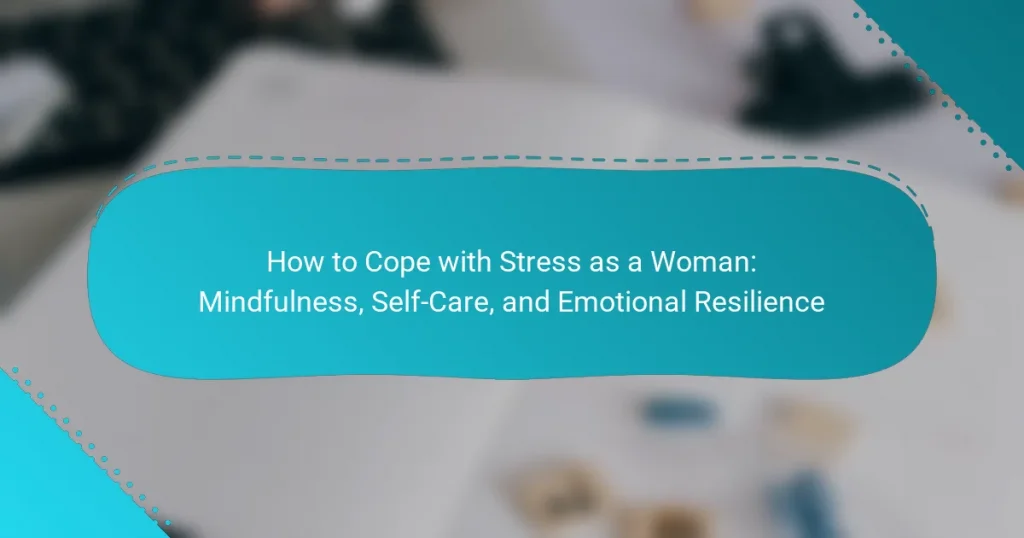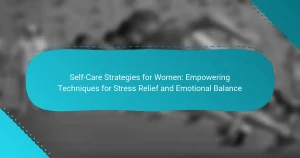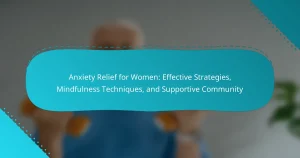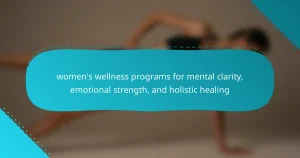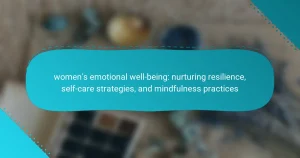Stress can significantly impact women’s mental and emotional well-being, especially due to work-life balance, financial pressures, and societal expectations. Mindfulness techniques promote present-moment awareness and emotional regulation. Effective self-care strategies, including physical activity and social support, enhance resilience. Unique practices like nature therapy and laughter yoga offer additional benefits for coping with stress.
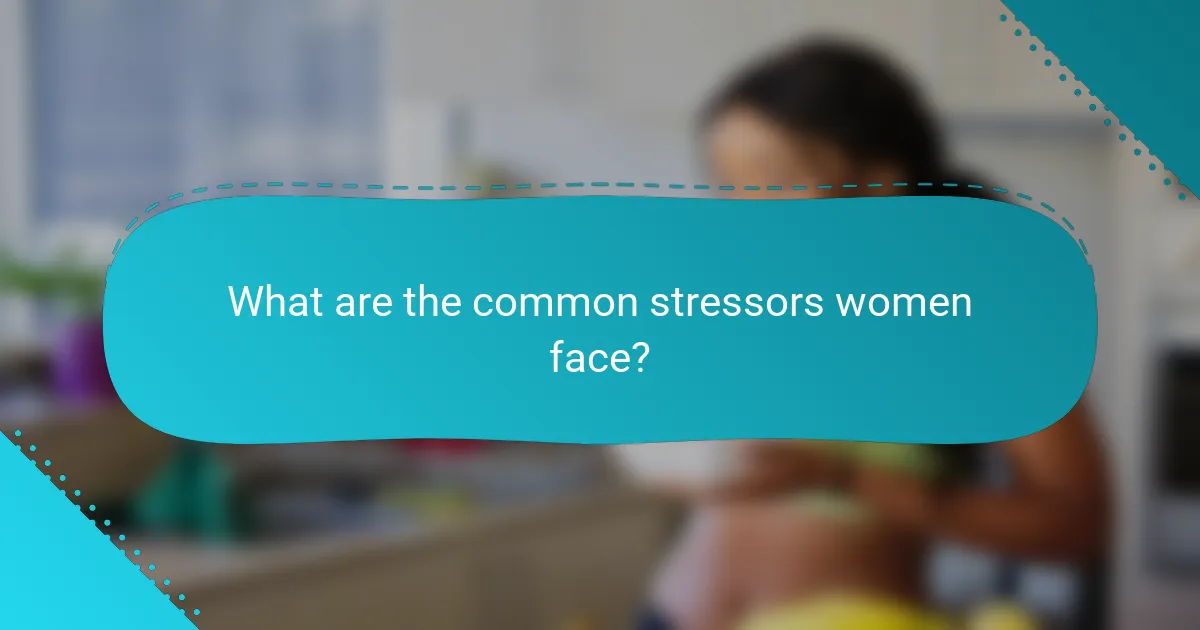
What are the common stressors women face?
Common stressors women face include work-life balance, financial pressures, relationship challenges, societal expectations, and health concerns. These stressors can significantly impact mental and emotional well-being. Women often juggle multiple roles, leading to increased stress levels. Research indicates that around 70% of women report feeling overwhelmed by daily responsibilities, highlighting the need for effective coping strategies. Mindfulness practices, self-care routines, and building emotional resilience are essential for managing these stressors effectively.
How do societal expectations contribute to stress?
Societal expectations significantly contribute to stress in women by imposing unrealistic standards. These pressures can lead to feelings of inadequacy and overwhelm. Women often face demands related to career success, family responsibilities, and social appearances, which can create a constant sense of urgency. Mindfulness practices can help counteract these stressors by promoting self-acceptance and emotional resilience. Engaging in self-care routines allows women to prioritize their well-being, reducing the impact of external expectations.
What role does work-life balance play in women’s stress levels?
Work-life balance significantly reduces stress levels in women by promoting mental well-being and emotional resilience. A study found that women with a healthy work-life balance experience lower anxiety and improved overall health. Prioritizing self-care and mindfulness practices enhances this balance, enabling women to manage stress effectively. Implementing strategies such as setting boundaries, engaging in leisure activities, and practicing mindfulness can further mitigate stress.
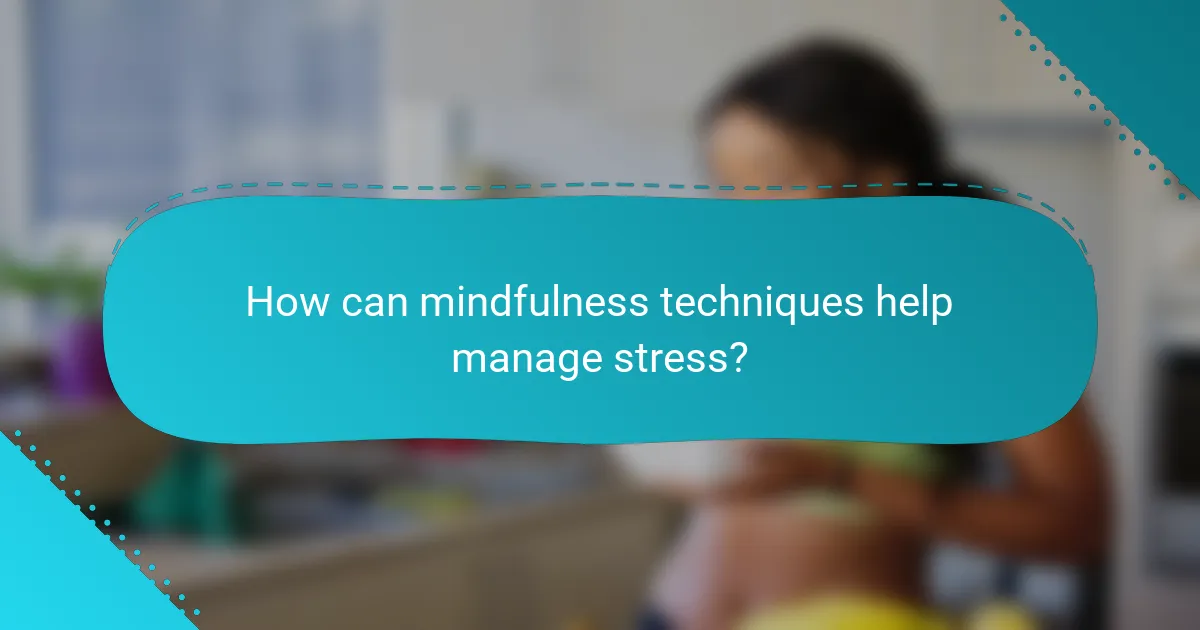
How can mindfulness techniques help manage stress?
Mindfulness techniques effectively reduce stress by promoting present-moment awareness and emotional regulation. These practices enhance self-awareness, enabling women to identify stress triggers and respond more effectively. Research shows that mindfulness can lower cortisol levels, improve mood, and increase resilience. Techniques such as meditation, deep breathing, and mindful walking foster relaxation and clarity, helping women cope with daily pressures. Regular practice can lead to long-term benefits, including improved emotional health and a greater sense of control over stressors.
What are effective mindfulness practices for women?
Mindfulness practices for women include meditation, deep breathing, and body scans. These techniques enhance emotional resilience and reduce stress.
1. Meditation: Regular practice can improve focus and emotional clarity.
2. Deep Breathing: Engaging in this technique promotes relaxation and lowers anxiety.
3. Body Scans: This practice increases body awareness and helps release tension.
4. Journaling: Writing about feelings fosters self-reflection and emotional processing.
5. Nature Walks: Connecting with nature can enhance mood and reduce stress levels.
How can breathing exercises reduce stress?
Breathing exercises can significantly reduce stress by promoting relaxation and enhancing emotional resilience. These techniques activate the body’s relaxation response, lowering heart rate and cortisol levels. Practicing deep, mindful breathing helps women manage stress more effectively, fostering a sense of control and calm. Regular engagement in these exercises can lead to improved mental clarity and overall well-being.
What is the impact of meditation on emotional health?
Meditation significantly enhances emotional health by reducing stress and promoting resilience. Regular practice fosters self-awareness, helping women manage anxiety and improve overall emotional balance. Research indicates that mindfulness meditation can decrease symptoms of depression and increase positive emotions. As a result, individuals experience improved coping mechanisms, enhancing their ability to handle life’s challenges effectively.
How does mindfulness improve emotional resilience?
Mindfulness enhances emotional resilience by promoting awareness and acceptance of emotions. This practice helps women manage stress effectively, allowing for better emotional regulation. Research shows that mindfulness can reduce anxiety and improve overall mental health. Regular mindfulness practice leads to increased self-awareness, fostering a greater understanding of emotional triggers and responses. Consequently, women can develop healthier coping mechanisms, enabling them to navigate life’s challenges with greater ease.
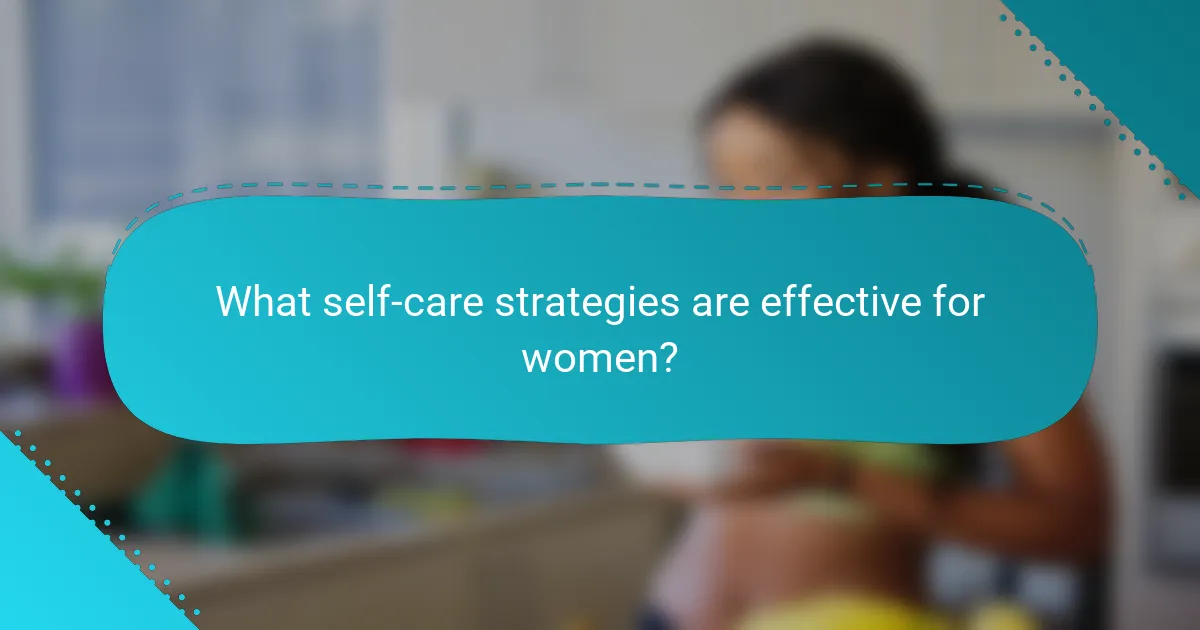
What self-care strategies are effective for women?
Effective self-care strategies for women include mindfulness practices, physical activity, and social support. Mindfulness techniques, such as meditation and deep breathing, enhance emotional resilience. Regular exercise improves mood and reduces stress. Connecting with friends or support groups fosters a sense of belonging, which is crucial for mental well-being. Prioritizing sleep and maintaining a balanced diet also significantly contribute to stress management.
How can physical activity alleviate stress?
Physical activity effectively alleviates stress by releasing endorphins, improving mood, and enhancing mental clarity. Engaging in regular exercise, such as walking or yoga, fosters emotional resilience and promotes mindfulness. Studies show that even short bursts of physical activity can reduce anxiety levels significantly. As a unique attribute, aerobic exercises are particularly beneficial, as they increase heart rate and stimulate the production of stress-relieving hormones.
What role does nutrition play in mental wellness?
Nutrition significantly impacts mental wellness by influencing mood, cognitive function, and stress resilience. A balanced diet rich in nutrients supports neurotransmitter function, which regulates emotions. For example, omega-3 fatty acids found in fish enhance brain health and reduce anxiety. Vitamins B, D, and minerals like magnesium also play critical roles in maintaining mental stability. As a result, women coping with stress can benefit from mindful eating practices that prioritize whole foods, reducing processed items that may exacerbate anxiety.
How can hobbies and interests reduce stress?
Hobbies and interests can significantly reduce stress by providing an outlet for relaxation and creativity. Engaging in enjoyable activities diverts attention from stressors, promoting emotional resilience. Research indicates that hobbies can lower cortisol levels, improving overall mental health. Additionally, social hobbies foster connections, enhancing support systems essential for coping with stress.
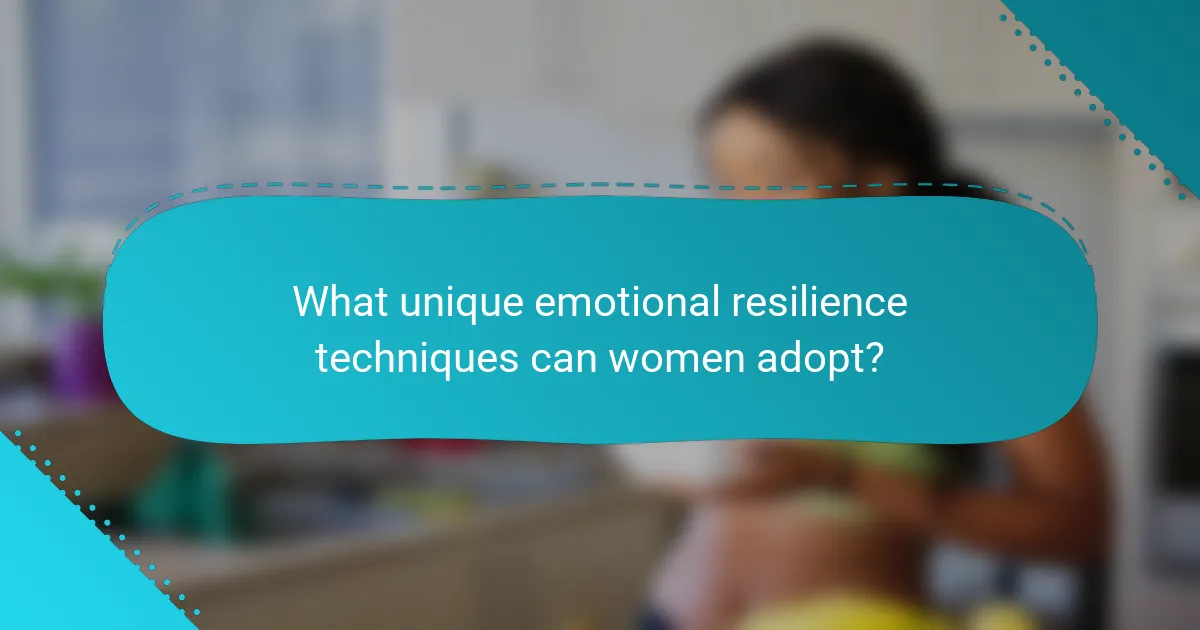
What unique emotional resilience techniques can women adopt?
Women can adopt unique emotional resilience techniques such as expressive writing, visualization, and community building. Expressive writing allows for emotional processing, enhancing self-awareness. Visualization techniques help in creating mental images of success, reducing anxiety. Building a supportive community fosters connection, providing a safety net during challenging times.
How does building a support network help?
Building a support network helps by providing emotional strength, practical assistance, and a sense of belonging. Women who connect with others experience reduced stress levels and improved coping mechanisms. A study found that social support can enhance emotional resilience, leading to better mental health outcomes. Engaging with a support network fosters open communication, allowing women to share experiences and strategies for managing stress effectively.
What are the benefits of journaling for emotional clarity?
Journaling enhances emotional clarity by facilitating self-reflection, reducing stress, and improving mood. It allows women to process emotions, identify triggers, and articulate thoughts. Studies show that expressive writing can lead to decreased anxiety and increased emotional resilience. Regular journaling fosters mindfulness, helping women to stay present and manage stress effectively.
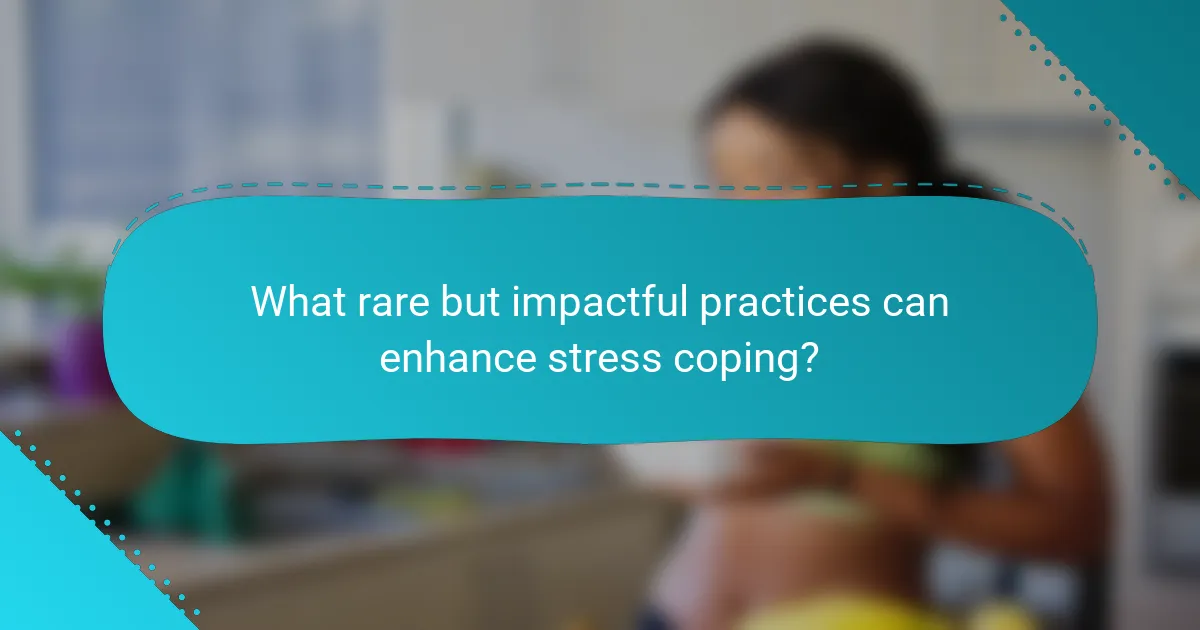
What rare but impactful practices can enhance stress coping?
Engaging in rare practices like nature therapy, art therapy, and laughter yoga can significantly enhance stress coping for women. Nature therapy involves immersing oneself in natural environments, which has been shown to reduce cortisol levels and improve mood. Art therapy allows for emotional expression through creative outlets, fostering resilience and self-discovery. Laughter yoga combines laughter exercises with yoga breathing, promoting relaxation and a sense of community. These unique approaches offer impactful benefits beyond traditional stress management techniques.
How can art therapy contribute to stress relief?
Art therapy significantly contributes to stress relief by providing a creative outlet for emotional expression. Engaging in artistic activities reduces anxiety and promotes relaxation, allowing individuals to process complex feelings. Studies indicate that art therapy can lower cortisol levels, a key stress hormone, enhancing overall emotional well-being. Additionally, it fosters mindfulness, as participants focus on the present moment during creation. This unique attribute of art therapy makes it a powerful tool for women seeking effective stress management strategies.
What is the significance of nature therapy for women?
Nature therapy significantly benefits women by enhancing emotional resilience and reducing stress. Engaging with nature promotes mindfulness, allowing women to reconnect with their surroundings. Studies indicate that spending time outdoors can lower cortisol levels and improve mood, providing a natural antidote to stress. Additionally, nature therapy fosters social connections, which are crucial for emotional support. This holistic approach empowers women to develop coping strategies, ultimately leading to better mental health outcomes.
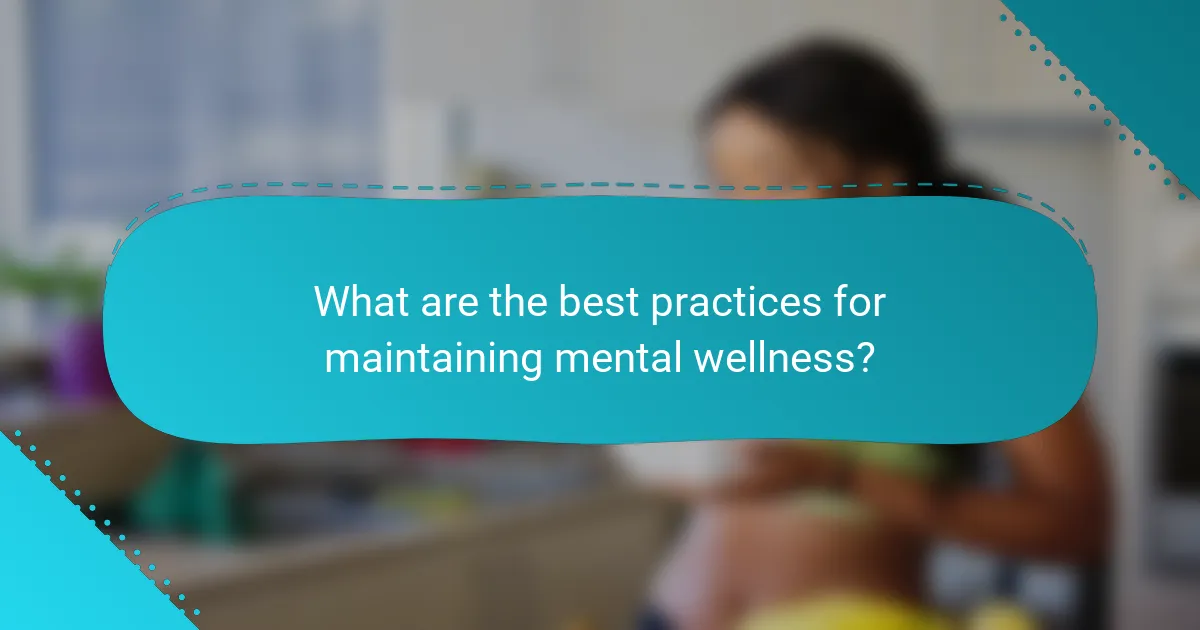
What are the best practices for maintaining mental wellness?
To maintain mental wellness, women should prioritize mindfulness, self-care, and emotional resilience. Practicing mindfulness enhances self-awareness and reduces stress. Engaging in self-care activities such as exercise, proper nutrition, and adequate sleep supports overall mental health. Building emotional resilience through supportive relationships and coping strategies helps navigate life’s challenges effectively.
How can women create a personalized self-care routine?
Women can create a personalized self-care routine by identifying their unique stressors and preferences. Start by assessing emotional needs, physical health, and available time. Incorporate mindfulness practices, such as meditation or yoga, to enhance emotional resilience. Schedule regular activities that bring joy, like reading or nature walks, to foster well-being. Additionally, prioritize self-reflection to adapt the routine as needs change.
What common mistakes should women avoid in stress management?
Women should avoid neglecting self-care, dismissing emotions, overcommitting, and relying solely on external support in stress management. Prioritizing personal well-being, recognizing emotional needs, setting boundaries, and fostering internal resilience are essential. For example, regularly practicing mindfulness can enhance emotional resilience and reduce stress.
What expert insights can enhance coping strategies?
Expert insights can significantly enhance coping strategies for stress. Integrating mindfulness practices, such as meditation, can improve emotional resilience. Research indicates that women who engage in self-care routines report lower stress levels. Additionally, seeking social support strengthens coping mechanisms. These strategies promote a holistic approach to managing stress effectively.
